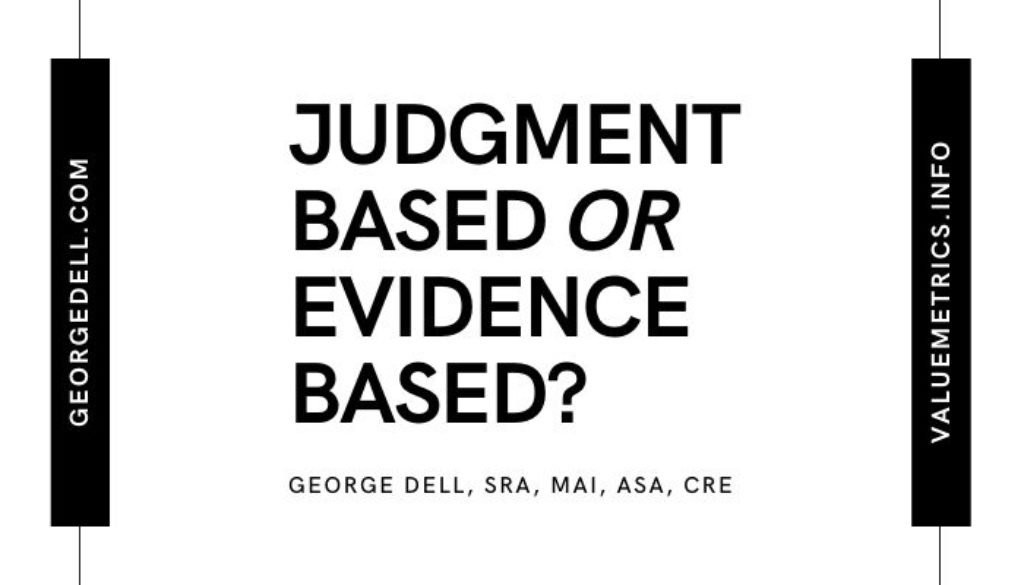Appraiser training tells us to use good judgment – repeatedly. In fact, the word ‘judgment’ is used over 300 times in the current USPAP book. It must be important.
It’s also used some 800 times in The Appraisal of Real Estate. It must be important.
The basis of appraisal theory in the United States is that the appraiser forms an opinion then finds ways to “support” that opinion. Hmmm. Sounds like bad science. Form an opinion then find evidence to support that opinion. It can’t be true!
Or can it?
What would be good science? And what is good science?
Science is “systematic study by observation or experiment by an expert in the field of study.” The systematic study follows a path of hypothesis, observation, and prediction. This path must be replicable. A reviewer, auditor, regulator, or other analyst must be able to get the same result.
In the appraisal process, the appraiser forms a judgment-opinion of the best 3-6 “comparables,” analyzes the undefined market, then supports adjustments “from the market”. (A market which has not exactly been identified!) All this is based on good judgment. The standard of care is worthiness of belief: credibility. Be credible! Must be important. Also it’s repeated in the USPAP (Uniform Standards of Professional Appraisal Practice) book over 300 times. Must be important.
Problem! The opinion science is dead on arrival. Judgment comes first. How can we reproduce what goes on in an appraiser’s head in picking comps? How?
Perhaps AVMs (Automated Valuation Models) are better. It turns out they are not. The AVM industry business model is secret algorithms. No one company wants other companies to learn their wonderful secret great algorithm. Picking comps is an AVM trade secret.
Appraisal is judgment-based. The appraiser has to be worthy. Worthy of belief! It says so in USPAP.
All our education. All our standards. All our regulations and laws. All our beliefs are about being worthy. All of today’s valuations are either black box, or grey mush. It’s about believability, not reliability.
Evidence-Based Appraisal© is different. Let’s look at the science:
- A hypothesis: This is a house. Its price will be similar to prices of similar houses.
- The observation: Classify all similarity data, using proper algorithms.
- The prediction: Analyze the sale prices for a result.
Human judgment is applied to model decisions, including helping the client identify the problem to be solved, the most likely ‘approach’ to the solution, and the predictive algorithms “adjustments.” Human judgment is also needed to deliver results understandable to the client’s level of competence.
EBV (Evidence Based Valuation)© is a data-science approach. The focus is on getting the data right. Those of us who properly practice these principles in all our affairs find that answers simply fall out and are easily understandable and convincing to users, regulators, auditors, and even traditional reviewers.

June 2, 2021 @ 6:16 am
I continue to be amazed at how prolific George is, coming up with new topics all the time.
While I cannot tell you how many years I have employed his approach, at least since 2006; I can tell you I get continual compliments from clients, on how easy my reports are to read, and convincing.
Getting the data right is certainly the key, but then, sometimes there is a dearth of data that is relevant to our subject. Meaning, sometimes we have more of an oblique view of value from our market data.
This may not be the case in most single family suburban or urban markets; but is it certainly true in outlying market or unique properties.
Three Ways to Pick Comps? Part II - George Dell, SRA, MAI, ASA, CRE
April 19, 2023 @ 1:15 am
[…] I became an appraiser, good judgment ruled. Commercial data was not available, and the MLS comp book came out every three months. […]